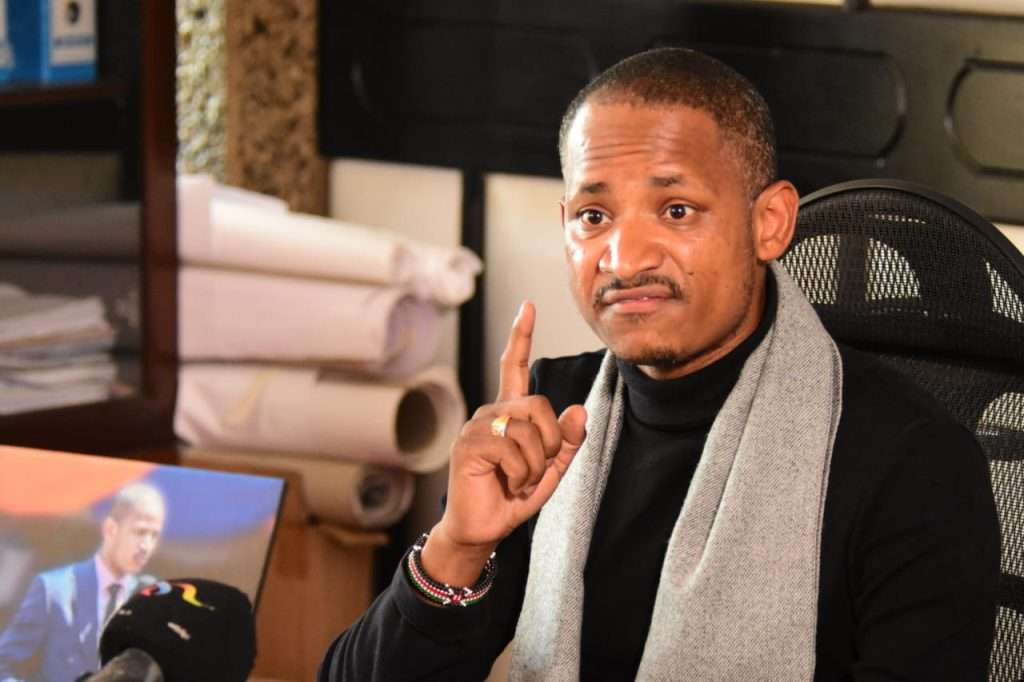News
I Will Be Governor With or Without ODM, Babu Owino Declares Amid Raila Fallout
“I am criticising the broad-based government because it’s the right thing to do,” he explained.

Embakasi East Member of Parliament Babu Owino has thrown down the gauntlet in Nairobi’s political arena, declaring his unwavering intention to contest the gubernatorial seat in 2027 regardless of whether his party, the Orange Democratic Movement, backs his bid.
The fiery second-term legislator’s announcement comes amid growing friction within ODM ranks, particularly following his vocal criticism of the broad-based government arrangement that has seen some party members embrace cooperation with President William Ruto’s administration.
This stance has evidently put him at odds with the party establishment, creating what many see as an inevitable collision course.
Despite the political turbulence, Owino remains defiant yet respectful of ODM leader Raila Odinga, whom he continues to refer to as “Baba.”
His approach reflects the delicate balance many politicians must strike when challenging party hierarchy while maintaining loyalty to revered figures.
“I know ODM may not give me the ticket because Johnson Sakaja was endorsed at the Bomas of Kenya,” Owino candidly admitted during a recent interview.
“But I love Baba. I know that I will not be given the ticket, but it doesn’t matter because I know it’s the citizens who vote.”
The MP’s reference to Sakaja’s endorsement highlights a significant hurdle in his path.
Raila Odinga’s backing of the current governor at the Bomas of Kenya venue sent clear signals about the party’s preferred candidate, effectively shutting the door on internal competition for the ODM ticket.
However, Owino appears unfazed by this political reality.
Drawing on his background as a former University of Nairobi student leader, he presents himself as a battle-tested politician whose rise has been built on personal merit rather than party patronage.
“Babu Owino is an institution,” he declared with characteristic confidence.
His criticism of the broad-based government arrangement underscores deeper ideological divisions within ODM.
While some party leaders have embraced dialogue and cooperation with the ruling administration, Owino maintains that principled opposition requires calling out perceived wrongs regardless of political convenience.
“I am criticising the broad-based government because it’s the right thing to do,” he explained. “As a leader, I can’t see wrong and support it in a public forum — not even in private.”
This principled stance, while potentially costly politically, appears to be central to Owino’s appeal to his base and his strategy for the gubernatorial race.
He positions himself as an uncompromising voice willing to challenge power regardless of personal cost.
The MP has not limited his political offensive to party dynamics, launching a comprehensive attack on Governor Sakaja’s administration.
His critique encompasses financial mismanagement, poor leadership, and what he characterizes as governance “in disregard of the rule of law.”
Owino’s accusations are specific and serious, ranging from delayed implementation of oversight recommendations to declining revenue collections.
He has called for investigations by the Directorate of Criminal Investigations and prosecution by the Ethics and Anti-Corruption Commission, painting a picture of systemic failure in county governance.
“This governor will be impeached by Kenyans at the ballot,” Owino predicted confidently.
“I will be remembered as someone who changed lives for the better — someone who took children to school, built roads, and created jobs for Nairobians.”
His campaign narrative centers on restoration and transformation, promising to return Nairobi to what he terms its “lost glory.”
This message resonates with many city residents frustrated by persistent challenges in service delivery, infrastructure, and governance.
The political mathematics, however, remain complex.
Running as an independent candidate in Nairobi’s highly competitive political landscape presents significant challenges, from resource mobilization to voter mobilization.
Yet Owino’s confidence suggests he believes his personal brand and grassroots support can overcome these traditional disadvantages.
His relationship with Raila Odinga adds another layer of complexity to the unfolding drama.
While maintaining public respect for the ODM leader, Owino uses familial metaphors to explain their political differences, suggesting that personal loyalty need not translate to blind political obedience.
“In a family set-up, a father can love one child more than another, but that can’t make me bitter with my father or hate him,” he explained, demonstrating political maturity that contrasts with his often combative public persona.
As 2027 approaches, Owino’s declaration sets the stage for what promises to be a fascinating three-way contest for City Hall, with implications extending far beyond Nairobi’s boundaries.
His willingness to challenge party hierarchy while maintaining ideological consistency positions him as a unique figure in Kenya’s evolving political landscape.
Whether his gamble pays off will ultimately depend on his ability to convert political defiance into electoral victory, transforming principled opposition into governing mandate.
Kenya Insights allows guest blogging, if you want to be published on Kenya’s most authoritative and accurate blog, have an expose, news TIPS, story angles, human interest stories, drop us an email on [email protected] or via Telegram
-

 Grapevine2 weeks ago
Grapevine2 weeks agoAlleged Male Lover Claims His Life Is in Danger, Leaks Screenshots and Private Videos Linking SportPesa CEO Ronald Karauri
-

 Grapevine1 week ago
Grapevine1 week agoRussian Man’s Secret Sex Recordings Ignite Fury as Questions Mount Over Consent and Easy Pick-Ups in Nairobi
-

 Investigations5 days ago
Investigations5 days agoMulti-Million Dollar Fraud: Three Kenyans Face US Extradition in Massive Cybercrime Conspiracy
-

 Economy4 days ago
Economy4 days agoIran Demands Arrest, Prosecution Of Kenya’s Cup of Joe Director Director Over Sh2.6 Billion Tea Fraud
-

 Investigations2 weeks ago
Investigations2 weeks agoEpstein’s Girlfriend Ghislaine Maxwell Frequently Visited Kenya As Files Reveal Local Secret Links With The Underage Sex Trafficking Ring
-

 News3 days ago
News3 days agoTHE FIRM IN THE DOCK: How Kaplan and Stratton Became the Most Scrutinised Law Firm in Kenya
-

 Business4 days ago
Business4 days agoA Farm in Kenya’s Rift Valley Ignites a National Reckoning With Israeli Investment
-

 Business2 weeks ago
Business2 weeks agoM-Gas Pursues Carbon Credit Billions as Koko Networks Wreckage Exposes Market’s Dark Underbelly






















